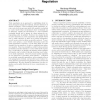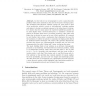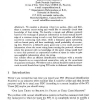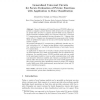164 search results - page 31 / 33 » Covert two-party computation |
CCS
2005
ACM
14 years 3 months ago
2005
ACM
In automated trust negotiation (ATN), two parties exchange digitally signed credentials that contain attribute information to establish trust and make access control decisions. Be...
WPES
2003
ACM
14 years 3 months ago
2003
ACM
Trust negotiation is an approach to establishing trust between strangers through the bilateral, iterative disclosure of digital credentials. Under automated trust negotiation, acc...
CRYPTO
2000
Springer
14 years 2 months ago
2000
Springer
In this work we use cryptography to solve a game-theoretic problem which arises naturally in the area of two party strategic games. The standard game-theoretic solution concept for...
EUROCRYPT
1995
Springer
14 years 1 months ago
1995
Springer
We coiisider a situation where two parties, Alice and Bob, share a common secret string arid would like to mutually check their knowledge of that string. We describe a simple and e...
ICISC
2008
13 years 11 months ago
2008
Secure Evaluation of Private Functions (PF-SFE) allows two parties to compute a private function which is known by one party only on private data of both. It is known that PF-SFE c...




